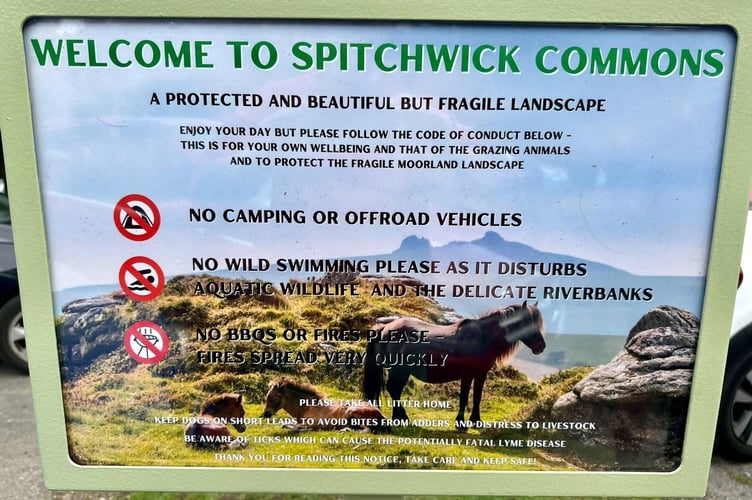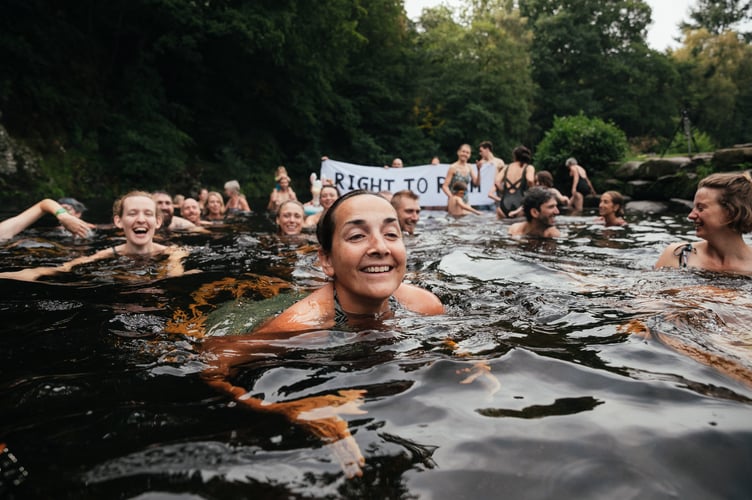SWIMMING has been banned at one of Dartmoor’s most iconic spots, or has it?
Situated on the River Dart, Spitchwick has been a family favourite for a Dartmoor day out for generations.
However, Spitchwick’s latest visitors arrived to find a sign shown adjacent, stating: ‘No wild swimming please as it disturbs aquatic wildlife and the delicate riverbanks.’
Rather than coming from Dartmoor National Park Authority, it is the Simpson Family, owners of the Spitchwick estate, who are responsible for the signs.

The so-called ‘ban’ to swimming doesn’t just affect the area known as Spitchwick, but the Simpson Family’s entire Spitchwick Estate, which includes 17km of the River Dart. The only exception to this is within the River Dart Country Park, which the Simpson Family also own.
The new signs caused an outcry from locals, swimming groups and access campaigners.
Joanna Reeve had been swimming in the Dart for over 30 years. ‘The signs shocked me,’ said Joanna.
‘I’ve been swimming here for years but these signs sent a clear message that swimmers aren’t welcome.’
The new signs, perceived by most as a ban, triggered a 40 person-strong rally and a ‘protest swim’ on Sunday in defiance. Groups included Right to Roam, The Stars Are For Everyone, and Friends of The Dart.
However, after a long silence, the Simpsons spoke out after the rally.
In a statement, Patrick Simpson said: ‘The request for no swimming is just that: a request, to protect the fragile banks from erosion and the aquatic environment. There is no ban and the wording will be changed to ask people to refrain from swimming.’
Lewis Winks, from Right to Roam, said: 'There is an undisputed right to swim on just 3% of England’s rivers - until these signs went up, a historic and customary right of access existed; making Spitchwick one of the very few places where swimming could be enjoyed unchallenged.
'It really doesn’t matter what the wording of the sign is, the Spitchwick estate have made it clear that they do not believe that the public should have a right to swim in these waters. Until we get a change to the law, piece by piece we will continue to lose access to our land and water.'
Speaking to the Mid-Devon Advertiser, Lewis also argued that the environmental argument doesn’t hold much water. Lewis said: ‘The estate has not always been welcoming to public access.

‘There might be some localised erosion to the bank as it is a popular site, but one of the reasons for this is that further downstream there is a sewage outlet. To say that the issues that the Dart faces are because of the public misses a broader point of river pollution coming from other sources.
It also misses the point that it has precisely been people accessing rivers and quite often trespassing that have been at the forefront of sounding the alarm on river pollution.’
Lewis also pointed out that the Site of Special Scientific Interest (SSSI) that encompasses Spitchwick is not deemed to be deteriorating.
He added: ‘There is absolutely nothing in the SSSI assessment about access or swimming and in fact, those sites around Spitchwick are actually doing well. Only one bit is missing of the Spitchwick Estate that isn’t part of an SSSI, and that’s the River Dart Country Park, so I’d instead be asking questions about that.’




